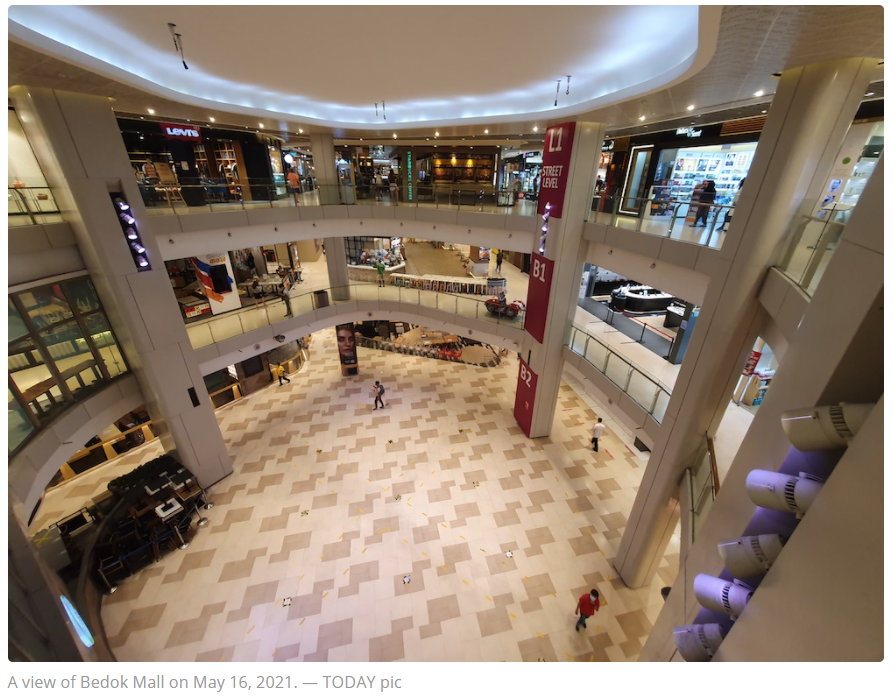Sales at retail stores in some Singapore heartland malls plummet on first day of tightened Covid-19 safety rules
SINGAPORE, May 17 — Even though they are allowed to remain open, stores in heartland malls that rely on walk-in traffic from diners who have meals at nearby eateries still saw their business plummet drastically on the first day when tightened Covid-19 safety regulations were imposed.
One retail worker at Kawata House of Socks in Bedok Mall, who wanted to be known only as Michelle, said that the shop made just S$100 in sales by around 3.30pm on Sunday (May 16).
Comparatively, it made S$1,000 in sales by the same time last week.
“It’s bad, very bad. We are quite dependent on walk-ins, especially those who come in after their meals, or while queueing at the nearby (popular Japanese restaurant) Sushiro,” she told TODAY in Mandarin.
“Today, there are no queues at Sushiro and the mall is very quiet.”
Food-and-beverage establishments, including hawker centres and food courts, are not allowed to have dine-in customers from May 16 to June 13, and are limited to fulfilling takeaway and delivery orders.
For malls and showrooms, they have to observe occupancy limits, which were reduced from 10 sqm per person of gross floor area to 16 sqm per person. Odd- and even-date entry restrictions on Sundays for popular malls, such as at Lucky Plaza and Peninsula Plaza, will continue.
On Sunday, Enterprise Singapore announced that it will be reintroducing schemes to help food outlets and retailers affected by Covid-19 Phase 2 (heightened alert) restrictions to offset their delivery costs and to go online with reintroduced government schemes.
Nevertheless, at Bedok Mall, retailers said that footfall was dismal, even though the Government’s human traffic application Space Out showed that the mall was “crowded” when TODAY visited at around 3pm.
It was slightly better for shops that provide customised services, such as an optical shop in Tampines Mall. While the mall was far less crowded than usual, the store still had steady sales as online appointments were made ahead of time.
The shopkeeper working there, who did not want to be identified, said that it still had customers walking in for their regular appointments on Sunday, so sales have not been bad so far.
“There are fewer walk-in customers for sure, but normally walk-in customers don’t buy anything so it’s not significant for now.”
While checking out five suburban malls, TODAY found that shopkeepers at various retail stores are anticipating their businesses to be badly affected over the next month due to the stricter rules imposed to curb the rising number of Covid-19 cases in the community here.
Human traffic was light at the five malls visited by TODAY at around 3pm to 5pm on Sunday. Crowds were spotted only at the supermarkets located within the malls.
One shopper, retired driver KS Poh, 62, said: “I came out to buy food. I’m shopping because unlike youngsters, I don’t like buying my things online.”
‘There’s no one around’
Things were quiet for retail outlets at AMK Hub as well, where shopkeepers said that the number of patrons have gone down by more than half on Sunday.
Candy Khoo, 50, who works at shoe store The Flip Flop Shop in the mall, said that there were hardly any customers so far in the day.
“In the past, we could rely on customers who would come in after grabbing a bite or taking their children to the tuition centres upstairs. But today, there is no one here.”
Similarly, over at Canberra Plaza in Sembawang, salesperson Tan Shao Wei said that as of 3pm on Sunday, he had seen just five customers walk into gadget shop Premium where he works.
The 27-year-old said that he would usually see around 10 to 15 patrons a day.
A supervisor at Ngee Soon Jewellery, who wanted to be known only as Ms Loh, observed that Canberra Plaza was at 30 per cent capacity on Sunday when on a regular day, it would at least be up to 50 per cent.
The outlook may seem bleak, but the retail workers said that their bosses are unlikely to close shop temporarily to save on manpower and operating costs over the next month.
They would rather have at least one or two patrons each day than to have no sales at all.
The workers themselves also preferred to have the stores remain open or else they would not get paid for the month.
For instance, Grace Chan, 60, a salesperson at shoe store DL Discount Loft, recalled that she did not receive her salary for one month last year when the store closed during the partial lockdown last April and May.
“The most important thing is for us to remain open so that we can try to cover costs. If not, maybe our salaries will be affected,” she said in Mandarin. — TODAY


 English
English




